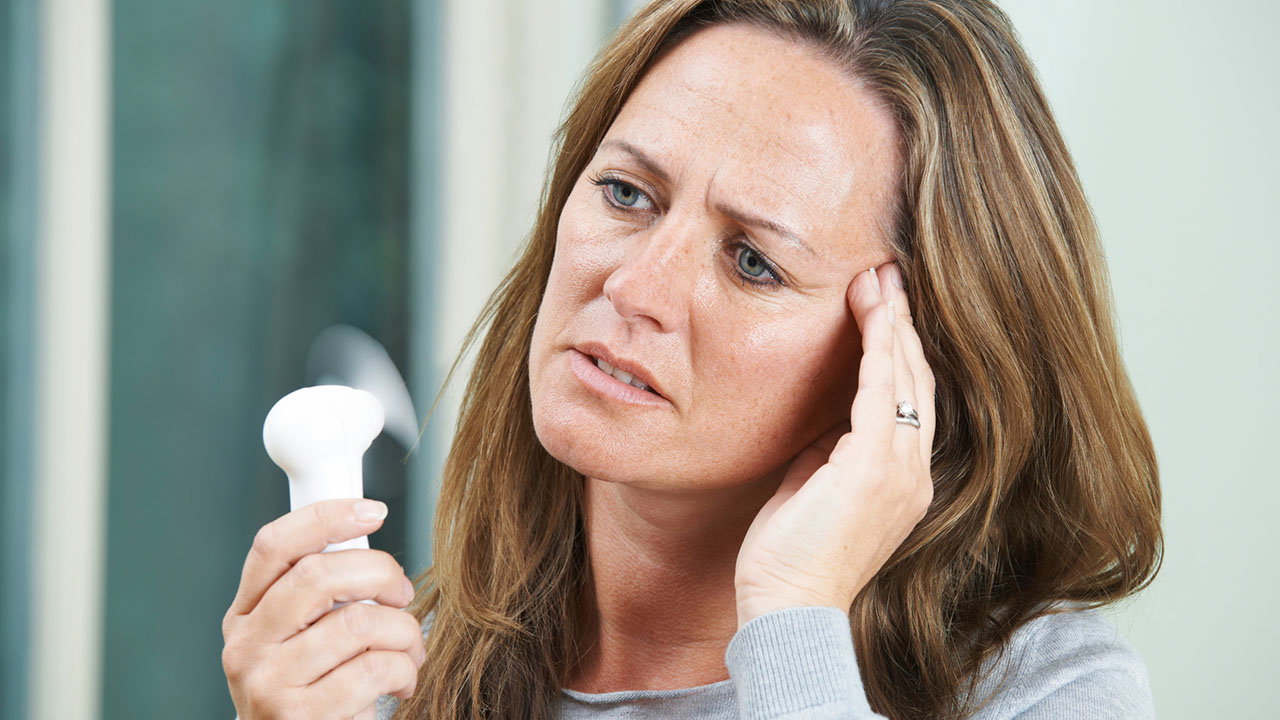 MonkeyBusiness Images/PhotoSpin
MonkeyBusiness Images/PhotoSpin
About 85 percent of women going through menopause experience hot flashes. Hot flashes also known as hot flushes, or vasomotor events are the most common symptom menopausal women experience.
Night sweats are also considered hot flashes, they just occur while a woman is sleeping.
Since hot flashes can happen any time day or night, it is not surprising that they can have an impact on other menopausal difficulties including sleep, changes in mood like anxiety and/or depression, and overall quality of daily activities in life.
During the North American Menopause Society's 2014 Annual Meeting, Dr. Nanette Santoro discussed Vasomotor Symptoms: Impact of Sleep, Mood and Quality of Life and Methods of Measurement.
Dr. Santoro shared two theories of how hot flashes could impact quality of life for women during menopause: The ‘Cascade’ Model of Hot Flash Disruption and The ‘Cumulative Burden’ Model.
In the ‘Cascade’ Model of Hot Flash Disruption the theory is that hot flashes, particularly at night, lead to changes in sleep patterns or sleep disturbances. The consistently poor sleep results in increased levels of anxiety and depression in menopausal women.
Women with moderate to severe hot flashes report more sleep disturbances in the second half of the night, which reduces their overall quality of sleep. As women are successfully treated for hot flashes, their sleep improves and so do their mood conditions.
Research shows that in perimenopausal women who have been diagnosed with adverse mood (anxiety and depression) sleep habits will improve before their mood becomes elevated. This indicates that better quality of sleep is a factor in improving mood.
The ‘Cumulative Burden’ Model is designed to look at the balance between the protective factors and the decompensating that impact the quality of life that women experience as they go through menopause.
Protective factors are factors that help stabilize or lessen menopausal symptoms. Some examples of protective factor are exercise, social support and health of the nervous system.
Decompensating factors or negative factors contributing to menopausal symptoms are hot flashes, poor sleep and adverse mood. One of the challenges of the decompensating factors is that they can make one another worse.
For example depression can cause sleeping problems, or consistent sleeping problems can cause depression. It can become a vicious cycle that cause women’s quality of life and health to become worse during menopause.
When the problems or ‘burdens’ become bad enough women seek treatment.
As women come in for treatment what are the best methods to define or assess their symptoms to help women get relief?
After reviewing several methods for measuring hot flashes, sleep and quality of life Dr. Santoro’s recommendations include:
• Allowing women to self-report hot flash frequency and severity
• Using the sternal skin conductance test to monitor hot flashes can beneficial
• Using women’s self-reported sleep scales can be accurate assessment for sleep
• Using EEG and actigraphy (a device that measure sleep cycles) as the primary tool to assess when sleep is the primary symptom
• Using many mood or quality of life assessment tools for mood assessments
These tools can support assessment and treatment of menopausal symptoms. Theyt allow the physician to understand which symptoms are causing the most difficulty and assess how the treatment is working with the patient.
Live Vibrantly,
Dr. Dae
Dr. Dae's website: www.healthydaes.com
Dr. Dae's book: Daelicious! Recipes for Vibrant Living can be purchased @ www.healthydaes.com
Dr. Dae's Bio:
Dr. Daemon Jones is your diabetes reversal, hormones, metabolism and weight loss expert. Dr. Dae is a naturopathic doctor who treats patients all over the country using Skype and phone visits. Visit her or schedule a free consultation at her website www.HealthyDaes.com
Sources:
The North American Menopause Society's 2014 Annual Meeting – Lecture
VASOMOTOR SYMPTOMS: IMPACT ON SLEEP, MOOD AND QUALITY OF LIFE AND METHODS OF MEASUREMENT. Nanette Santoro, MD
Professor and E Stewart Taylor Chair of Obstetrics & Gynecology
University of Colorado School of Medicine
Reviewed October 31, 2014
by Michele Blacksberg RN
Edited by Jody Smith





Add a CommentComments
There are no comments yet. Be the first one and get the conversation started!